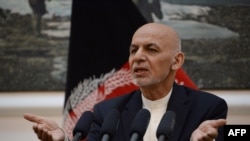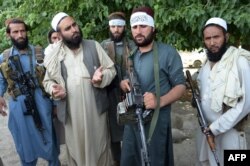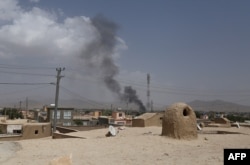The U.S. is ready to "support, facilitate and participate in direct negotiations between the Afghan government and the Taliban," U.S. Secretary of State Mike Pompeo said Sunday, the same day Afghan President Ashraf Ghani announced details for a new cease-fire.
"The United States welcomes the announcement by the Afghan government of a cease-fire conditioned on Taliban participation. This plan responds to the clear and continued call of the Afghan people for peace," Pompeo said in a statement.
"The last cease-fire in Afghanistan revealed the deep desire of the Afghan people to end the conflict, and we hope another ceasefire will move the country closer to sustainable security," the statement added, referring to a three-day cease-fire in June. There are "no obstacles to talks. It is time for peace," it added.
Earlier Sunday, Ghani announced a three-month unilateral, conditional cease-fire with the Taliban, hours after authorities confirmed the Islamist insurgency overran a northern district and apparently captured dozens of government soldiers.
Ghani explained Afghan forces will halt their operations from Monday, provided the insurgents reciprocate and respect also his truce.
The cease-fire coincides with the Muslim festival of Eid-ul-Adha marking the culmination of the annual pilgrimage to the holy city of Mecca and commemorating the sacrifice of Abraham.
There was no immediate reaction from the Taliban to the announcement.
A similar gesture by Ghani had prompted the Taliban in June to observe a temporary cease-fire during the three-day Eid-ul-Fitr festivities that marked the end of the fasting month of Ramadan.
Sunday's government peace gesture followed fighting in northern Faryab province.
Faryab Governor Naqibullah Fayiq told VOA the embattled Bilchiragh district had been under attack for several days and fell to insurgents Saturday because besieged Afghan security forces there could not receive timely reinforcements.
Fayiq would not discuss the fate of the government forces.Local media reported around 100 Afghan security personnel are missing.
A Taliban spokesman claimed its fighters entered the district without facing resistance from government forces. He added Afghan security forces "welcomed and joined hands" with the insurgency.
It was not possible to verify insurgent claims from independent sources and Afghan military officials were not available to discuss the battlefield details.
Post-fighting Ghazni situation
Elsewhere, the embattled southeastern Ghazni city, with an estimated population of 270,000, began receiving relief supplies Sunday, days after Afghan forces regained full control of the provincial capital from Taliban insurgents following several days of clashes.
The fighting caused massive damage to buildings and other infrastructure in Ghazni, leading to critical food and water shortages.
The U.N. estimated the fighting for the control of the strategically important city killed around 200 civilians while Afghan officials and media said the government and the Taliban collectively lost about 400 combatants.
Violence against aid workers
Meanwhile, a U.N. statement on World Humanitarian Day warned attacks against aid workers in the country this year have increased by 20 percent, with 23 killed, 37 injured and 74 abducted.It said during the first six months of this year, 1,692 civilians were killed by conflict, the highest number in the past decade.
More than 130 schools were attacked and two health facilities were destroyed.
Toby Lanzer, U.N. Humanitarian Coordinator for Afghanistan, renewed his call for all parties to the conflict to abide by their obligation under international humanitarian law and avoid targeting civilians and staff of relief groups in the country.
Last year, armed groups closed more than 140 health facilities, denying two million people access to health care.
"This worrisome trend continues in 2018. In July and August, more than 300,000 people were temporarily deprived of access to health care in Zabul province as a direct result of closure of health facilities," the U.N. agency said.


